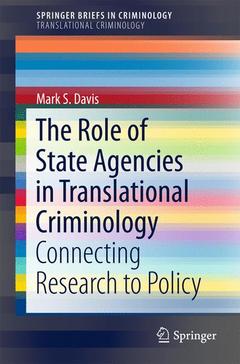The Role of State Agencies in Translational Criminology, 1st ed. 2017 Connecting Research to Policy SpringerBriefs in Translational Criminology Series
Auteur : Davis Mark S

Chapter 1: Introduction.- Chapter 2: An Overview of State-Level Criminal Justice.- Chapter 3: Impediments To Translation in the States.- Chapter 4: Real Examples of Translation.- Chapter 5: Hypothetical Examples of Translation.- Chapter 6: Conclusions and Recommendations.
Mark S. Davis has served in a variety of criminal justice practitioner, policy, and research roles. His scholarship has appeared in Current Psychology, Journal of Research on Adolescence, Social Psychiatry & Psychiatric Epidemiology, Journal of Criminal Justice, and other journals. Dr. Davis earned his Ph.D. in sociology from The Ohio State University.
Demonstrates the critical role that state agencies play in translating criminological knowledge into policy and practice
Serves as a blueprint for legislators and policymakers interested in reducing crime and improving the administration of criminal and juvenile justice
Provides strategies for researchers to make their policy-relevant researchers accessible to policy-makers?
Includes supplementary material: sn.pub/extras
Includes supplementary material: sn.pub/extras
Date de parution : 06-2017
Ouvrage de 63 p.
15.5x23.5 cm



